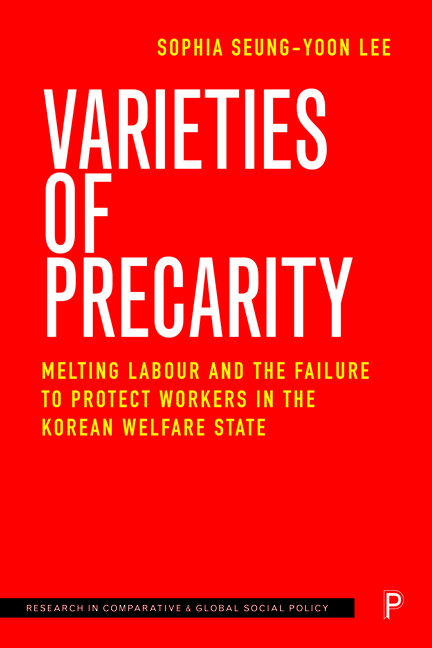 Varieties of Precarity
Varieties of Precarity Book contents
- Frontmatter
- Contents
- Series editors’ preface
- List of figures and tables
- Acknowledgements
- 1 Introduction: Melting labour and institutional inconsistency
- 2 Social protection policies and the South Korean labour market in comparative perspective
- 3 When insiders are kicked out: layoffs of regular workers in manufacturing
- 4 Same boat, different destiny: subcontracted workers in the Korean shipbuilding industry
- 5 Young and old outsourced female workers in call centres and cleaning services
- 6 Are freelancers really free? The Korean freelance labour market and the precarity of young freelancers
- 7 The digital precariat: various Korean platform workers and the new work logic
- 8 Conclusion: Towards universal institutional protection for precarious workers in the era of melting labour
- Notes
- References
- Index
7 - The digital precariat: various Korean platform workers and the new work logic
Published online by Cambridge University Press: 03 April 2024
- Frontmatter
- Contents
- Series editors’ preface
- List of figures and tables
- Acknowledgements
- 1 Introduction: Melting labour and institutional inconsistency
- 2 Social protection policies and the South Korean labour market in comparative perspective
- 3 When insiders are kicked out: layoffs of regular workers in manufacturing
- 4 Same boat, different destiny: subcontracted workers in the Korean shipbuilding industry
- 5 Young and old outsourced female workers in call centres and cleaning services
- 6 Are freelancers really free? The Korean freelance labour market and the precarity of young freelancers
- 7 The digital precariat: various Korean platform workers and the new work logic
- 8 Conclusion: Towards universal institutional protection for precarious workers in the era of melting labour
- Notes
- References
- Index
Summary
‘Artificial intelligence [AI] calculates the quantity and route together. It means that the AI sets up for whom, how much volume, and which route to allocate. But there, now called the baseline, there is accumulated data for this route. Here, the hourly workers delivered to several households, the difficulty of the route, and all these data are collected and set again as the baseline.’ (Delivery platform worker, male, age 30)
Insecurity of platform work
This chapter examines the labour status of platform workers in the Korean digital labour market, situated in cell 3 of the theoretical framework, which is characterised by a high level of melting labour but a low level of institutional protection consistency. Melting labour emphasises the ambiguity in determining a worker’s identity or employer, resulting in a legal blind spot for workers in new forms of work. The inconsistency of existing institutional protection policies and new forms of work brought about by the digital economy results in various forms of precarious work. Official data and legal definitions of platform work in Korea are presented, and the expansion of the platform labour market into diverse sectors with the advancement of technology and high internet usage rates in Korea is explained. The chapter categorises platform companies and workers and conducts interviews with workers in delivery, housekeeping services and high-skilled freelance platforms, examining their working conditions and experiences with social protection. The aim of this chapter is to shed light on the precariousness and lack of institutional protection experienced by platform workers in Korea. Specifically, it highlights the inconsistency of the social security system in providing coverage and mitigating insecurity for those situated in cell 3 of the theoretical framework.
Platform workers differ from traditional workers in that they typically have mediated employment arrangements rather than direct employment contracts, performing fragmentary and intermittent work while bearing costs for safety accidents and various expenses, such as computer or vehicle purchases, fuel, insurance premiums and repairs. As the digital division of labour expands, the insecurity of platform labour is exacerbated by the following characteristics of the labour process. The first characteristic is the three-sidedness and power asymmetry in data exchange (Schmidt, 2017).
- Type
- Chapter
- Information
- Varieties of PrecarityMelting Labour and the Failure to Protect Workers in the Korean Welfare State, pp. 139 - 161Publisher: Bristol University PressPrint publication year: 2023
